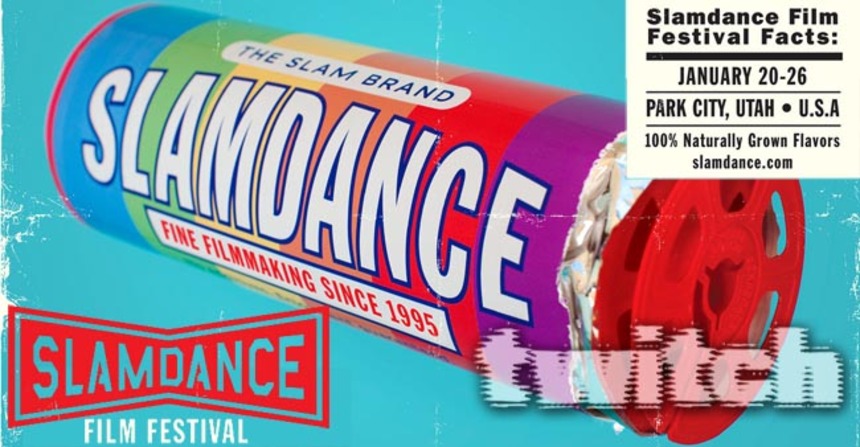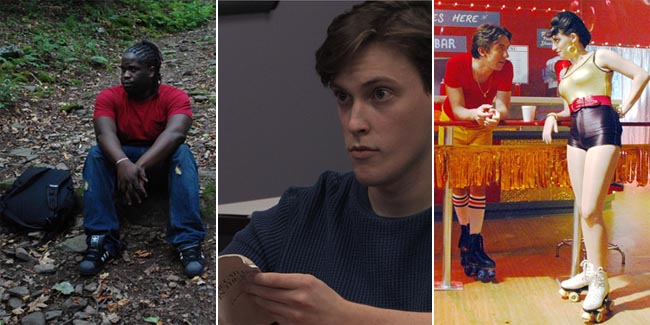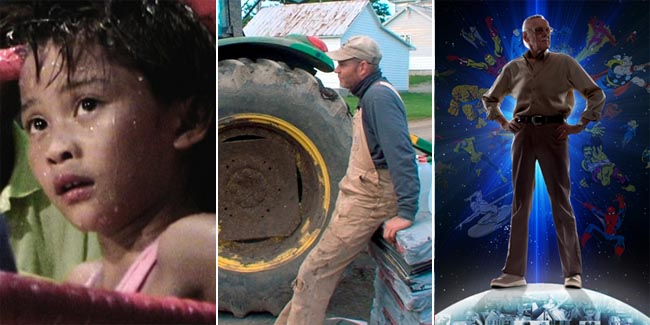Slamdance 2012 Rounded Up

Mountains of thanks to Andy Jurgensen (@theJURG) for visiting the top of Main Street, Park City on multiple occasions last week and filing this awesome roundup!
Now in its 18th incarnation, the Slamdance Film Festival is now considered Park City's true showcase for micro-budget filmmaking. Their motto "For Filmmakers, by Filmmakers" represents the dedication to a true community of emerging talent that can sometimes lack at the celebrity-driven Sundance Film Festival running simultaneously down the street. Of the 7 diverse films I was able to catch this year (4 narrative, 3 docs), all represent an original voice and worthy additions to the festival's lineup.

Blending the line between documentary and fiction, Welcome to Pine Hill is an intriguing character study about a former drug dealer coming to terms with a fatal illness. Director Keith Miller first met Shannon Harper during an argument in his neighborhood over a lost dog. When Miller later decided to use that real life argument as the opening scene in a film, he developed a character loosely based on Harper's life and asked the non-actor to be his star. What plays out on screen is a mixture of scripted and improvised scenes that showcase Harper's subtle but powerful performance. While many of the unscripted scenes do add a sense of authenticity, others didn't really work for me and ultimately hurt the film's flow. Still one of my faves of the festival and the film's unique process makes it deserving of the Slamdance Grand Jury Award for Feature Narrative.
There is no doubt that many will describe 20-year-old Andrew Edison's Bindlestiffs as an indie version of Superbad. We've seen the plot before: 3 high school virgins set out on a raunchy and curse-word filled adventure. The good news is that Bindlestiffs is able to inject a genuine adolescent spirit into its characters that most Hollywood teen comedies are rarely able to do. Shot over two years on a shoestring budget, the three stars (Andrew Edison, Luke Loftin, and John Karna) grew up together and have natural chemistry on screen. While the humor will be too crude for some, the film consistently delivers solid laughs, wacky scenarios and witty dialogue (most of which was improvised on set). Definitely a crowd pleaser (the film won the Slamdance Audience Award for Feature Narrative), I look forward to their next collaboration. Also, a special shout out to Shaun Parker's amusing self-reflexive short Hope. You Like Crap. which played before the film.
Inspired by campy flicks such as Roller Boogie and Xanadu, Andrew Bush's Roller Town is a mostly successful satire about a rollerskating obsessed town in the late 70's. When an evil mob boss begins converting everyone's favorite roller rink into a video arcade, our hero Leo (Mark Little) must use the power of rollerskating and disco to save the day. The comedy comes from Picnicface, a Canadian sketch comedy troupe, who appealed to their own internet fanbase to fund the majority of the film's budget. Roller Town starts out strong with many entertaining gags but unfortunately fizzles out halfway through when the film gets too caught up in plot. The most consistent laughs come from original disco songs performed by the fictional Boogaloos, who act as a sort of Greek chorus throughout the film. There is no doubt Roller Town will find distribution, even if it isn't quite theatrical.

I was really fascinated by Todd Kellstein's documentary, Buffalo Girls, which introduces us to the underground world of Muay Thai female child boxing. Focusing on two 8-year-old prizefighters, Stam and Pet, the film takes an even-handed approach to the controversial subject matter. Instead of criticizing the girls' participation outright, Kellstein gains the trust of Stam, Pet and their families and tries to understand how a tough economic climate initially led them to seek out the physically demanding sport. As the film plays out, it seems that these kids genuinely enjoy the attention, experience, and financial support they are able to provide their families. The film concludes with a nail-biting boxing match between the two girls that will leave audiences deciding for themselves whether the potential monetary gain outweighs Stam & Pet's lack of a normal childhood.
Five years ago, Paul and Phyllis Van Amburgh quit their jobs in the city, bought a neglected farm in upstate NY, relocated their children, and tried their luck as dairy farmers. Filmmaker Rudd Simmons documents their experiences in The First Season, a cinema vérité style doc that proves that modern farming is not for the faint of heart. The camera captures every seemingly mundane aspect of the Van Amburgh's journey: repairing milk pumps, nursing newborn calves, and avoiding creditors. In these details, Simmons expertly crafts a portrait of a family determined to make their new self-sustaining lifestyle a success. Deliberately paced and beautifully scored, The First Season is a worthy addition to the direct cinema genre.
In contrast, With Great Power: The Stan Lee Story is a flashy, high energy doc about the life of one of the comic book industry's most famous heroes. Made for a more geeky mainstream audience, this doc features celebrity talking heads (Nicolas Cage, Tobey Maguire, Frank Miller, Bryan Singer, etc.), previously unseen archival material, and multiple interviews with the man himself. The film comes across as a bit of a puff piece (Stan Lee's POW! Entertainment is one of the production companies involved), but in the end that really doesn't matter - the audience that will seek out and enjoy this doc are his fans. Not a huge comic book lover myself, my favorite scenes involve those featuring Stan and his longtime wife, Joan, bantering back and forth in their Los Angeles home. The film was bought by EPIX and will air on cable later this year.
I had high hopes for Sundowning, an experimental narrative exploring a young woman's deteriorating memory and the relationship with her nurse, but by the end of the 92-minute piece, I couldn't fully get on board. The film has very little dialogue and cleverly portrays the passage of time through a repeating series of routine activities. I appreciated the unusual sound design and hypnotic computer imagery that appears in the final act but ultimately I found the movie as a whole to be over indulgent. Writer/director Frank Rinaldi admitted during the Q&A that Sundowning is meant to be a challenging viewing experience but I fear that this tactic will frustrate more viewers than it will enlighten.







